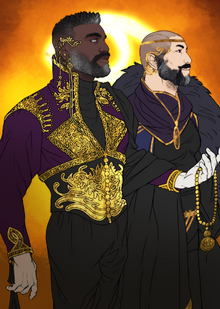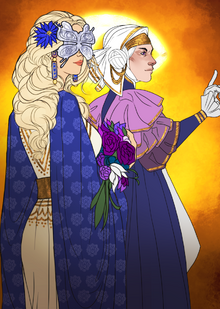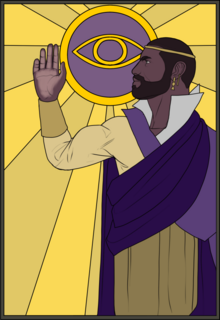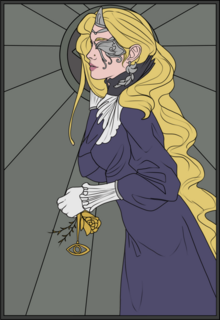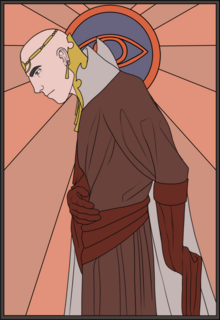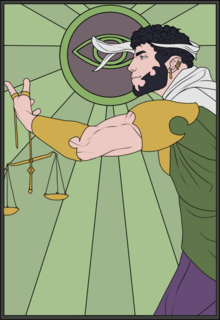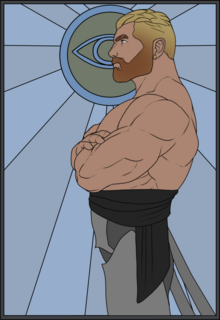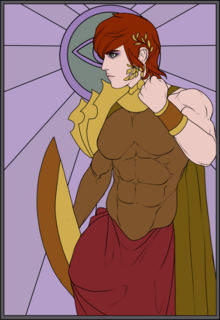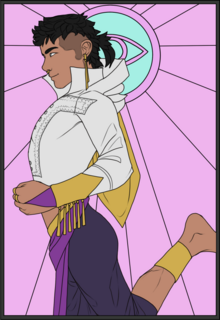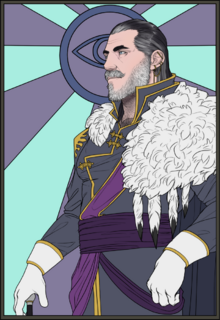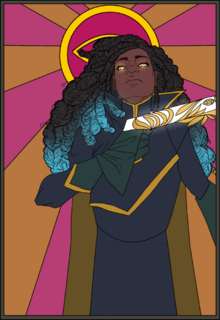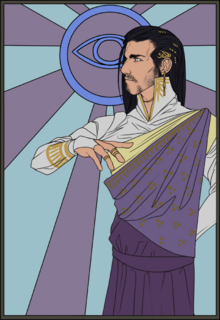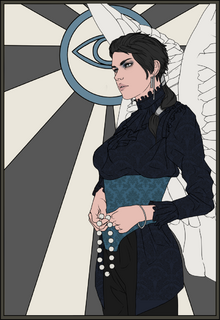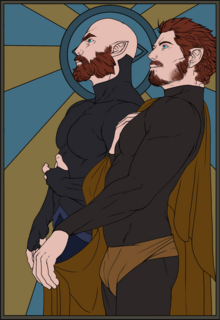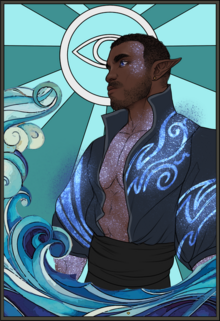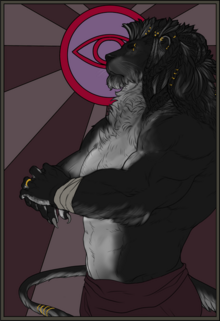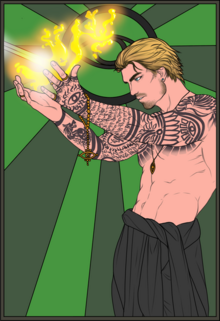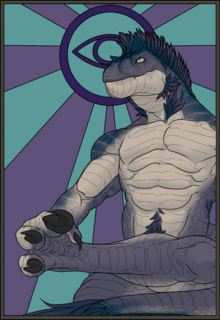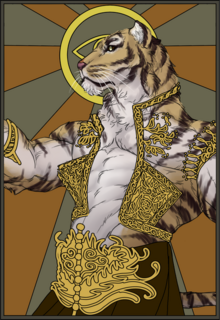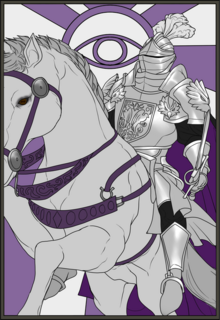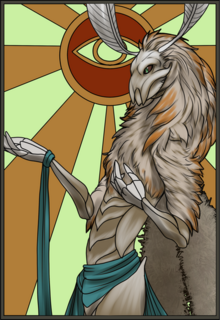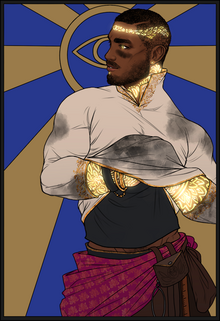More actions
mNo edit summary |
No edit summary |
||
| Line 8: | Line 8: | ||
* [[Guided Unionism]] | * [[Guided Unionism]] | ||
|}} | |}} | ||
==Origins== | ==Origins== | ||
The origins of Unionism are well recorded as it is one of the youngest religions in the world. Unionism was originally founded as an Ailor-only religion by the prophet Emperor Theomar I Ivrae-Kade, of the Regalian Empire following its founding. The prophet spoke about a divine entity called the Everwatcher contacting him in a series of visions, before appearing to him in person, to speak to him about the fate of all living things under the stewardship of the Ailor Race. Emperor Theomar then wrote the holy chronicle called the Creed, which acts like holy scriptures, containing all the religious laws and concepts dear to Unionism. Following the prophet’s death, it was ordained that the Everwatcher would select Emperors of Regalia as its Vessel through which it would speak and guide destiny. Each successive Emperor has made small and large changes to Unionist doctrine by editing parts of the Creed, meaning this holy scripture ended up being a document that evolved as time passed. The Religion has gone through various phases referred to as "ascendancy", "revisionism", and "advancing". The first of which defined a period up to the Regalian Pessimism when all Races were welcome, but the faith was very strictly enforced. The Revisionist era ran concurrent with the pessimism up until the Ranger Crisis, when ultra nationalists attempted to revise the interpretation of Creed and civil governance to make Unionism more Ailor-ethnic-centric and push down on other religions even harder. The Advancing era starting roughly with the rule of Emperor Alexander I is hallmarked by a return to the racial inclusion of the Ascendancy era, while also loosening the repressive enforcement of the Revisionism era, creating even an interpretation of Unionism that was more palatable to non-believers to support. Unionism is fairly unique in comparison to other religions, in that it suffered several schisms, major events of theological conflict between its worshipers that resulted in the community splitting each time. As such, there are 3 distinct Unionist beliefs now: Dogmatic, Evintarian, and Guided. Each of these have their own structures, beliefs, and hierarchy, though all invariably worship the Everwatcher, and work towards a common goal, of Regalian hegemony and rule over all the world and its people and for the Emperor of Man to become the Emperor of All. | The origins of Unionism are well recorded as it is one of the youngest religions in the world. Unionism was originally founded as an Ailor-only religion by the prophet Emperor Theomar I Ivrae-Kade, of the Regalian Empire following its founding. The prophet spoke about a divine entity called the Everwatcher contacting him in a series of visions, before appearing to him in person, to speak to him about the fate of all living things under the stewardship of the Ailor Race. Emperor Theomar then wrote the holy chronicle called the Creed, which acts like holy scriptures, containing all the religious laws and concepts dear to Unionism. Following the prophet’s death, it was ordained that the Everwatcher would select Emperors of Regalia as its Vessel through which it would speak and guide destiny. Each successive Emperor has made small and large changes to Unionist doctrine by editing parts of the Creed, meaning this holy scripture ended up being a document that evolved as time passed. The Religion has gone through various phases referred to as "ascendancy", "revisionism", and "advancing". The first of which defined a period up to the Regalian Pessimism when all Races were welcome, but the faith was very strictly enforced. The Revisionist era ran concurrent with the pessimism up until the Ranger Crisis, when ultra nationalists attempted to revise the interpretation of Creed and civil governance to make Unionism more Ailor-ethnic-centric and push down on other religions even harder. The Advancing era starting roughly with the rule of Emperor Alexander I is hallmarked by a return to the racial inclusion of the Ascendancy era, while also loosening the repressive enforcement of the Revisionism era, creating even an interpretation of Unionism that was more palatable to non-believers to support. Unionism is fairly unique in comparison to other religions, in that it suffered several schisms, major events of theological conflict between its worshipers that resulted in the community splitting each time. As such, there are 3 distinct Unionist beliefs now: Dogmatic, Evintarian, and Guided. Each of these have their own structures, beliefs, and hierarchy, though all invariably worship the Everwatcher, and work towards a common goal, of Regalian hegemony and rule over all the world and its people and for the Emperor of Man to become the Emperor of All. | ||
| Line 53: | Line 21: | ||
==Core Identity== | ==Core Identity== | ||
Unionism is a Polytheistic religion with a single superior divine being, who is intangible and provides only spiritual guidance, while the Gods and Goddesses interact with the faithful and apply their divine will and power on the world. This intangible supreme being called the Everwatcher reincarnates in every Regalian Emperor (passing through females, but never permitting them to inherit) when they pass on to guide the mortals through the Emperor's words. Unionism has tenets, but as opposed to a clear set of vices and virtues, Unionism's Tenets are the Divine Lessons (which increase as new Gods are added over time). Unionism is unique when compared to other Religions as it did not start out with a Pantheon save for the Everwatcher, the supreme being, and Theomar the Prophet. It expands as time passes, as new Gods and Goddesses are discovered, or Gods from other conquered religions are added. This makes Unionism the only true Syncretic religion in the world, which generally promotes stability and cultural exchange in the Empire. Each God and Goddess represents a Divine Lesson, which is a guideline to live one's life by, but also a vice to avoid. | Unionism is a Polytheistic religion with a single superior divine being, who is intangible and provides only spiritual guidance, while the Gods and Goddesses interact with the faithful and apply their divine will and power on the world. This intangible supreme being called the Everwatcher reincarnates in every Regalian Emperor (passing through females, but never permitting them to inherit) when they pass on to guide the mortals through the Emperor's words. Unionism has tenets, but as opposed to a clear set of vices and virtues, Unionism's Tenets are the Divine Lessons (which increase as new Gods are added over time). Unionism is unique when compared to other Religions as it did not start out with a Pantheon save for the Everwatcher, the supreme being, and Theomar the Prophet. It expands as time passes, as new Gods and Goddesses are discovered, or Gods from other conquered religions are added. This makes Unionism the only true Syncretic religion in the world, which generally promotes stability and cultural exchange in the Empire. Each God and Goddess represents a Divine Lesson, which is a guideline to live one's life by, but also a vice to avoid. | ||
===Beliefs=== | ===Beliefs=== | ||
| Line 80: | Line 28: | ||
==Gods and Goddesses== | ==Gods and Goddesses== | ||
Unionism | Unionism is currently undergoing the Divine Merger, involving the Schisms coming back to the mother Unionist religious community. This process will be slow, so updated Gods will be added to this list as time passes, with the old forms still shown below. | ||
<table style="width: 100%;"><tr><td style="width: 50%; vertical-align: top; text-align: left;"> | |||
<span style="font-size:150%;><center>'''Prophet Gods Theomar and Thedmir'''</center></span> | |||
{| | |||
[[File:Thomur.png|220px|caption|left]] | |||
| | |||
* '''Name:''' Theomar (left) and Thedmir (right), the Prophet Gods, first believers. | |||
* '''Patron:''' Fathers, Rulers, Nobles, Leaders, Commanders, and Best Friends. | |||
* '''Symbols:''' Theomar and Thedmir are symbolized by the necklace of friendship. | |||
* '''Role:''' Theomar and Thedmir were the Prophets of Unionism, spreading the faith. | |||
* '''Traits:''' Patriarchy, Insight, Good Governance, Loyalty, Friendship, Faith. | |||
* '''Temple:''' The All-Beacon Temple in Regalia proper, the largest Unionist Temple. | |||
* '''Allies:''' Regulus Worshipers, Dáuw Worshipers, anyone in the military. | |||
* '''Enemies:''' In essence all Evolist worshipers, and all Vola Fornoss Gods. | |||
* '''Rituals:''' Theomar and Thedmir Rituals involve re-enacting the struggles of them in the early days of Unionism. This involves preaching the faith to non believers, aiding the faithful in the defense of their holy shrines and places of worship, to mediate and act as diplomat for embattled groups, and to provide spiritual guidance to the Military. Theomar and Thedmir also have rituals concerning the sanctification and re-affirmation of friendship. | |||
|} | |||
</td><td style="vertical-align: top; width: 50%;"> | |||
<span style="font-size:150%;><center>'''Mother Gods Ness and Eora'''</center></span> | |||
{| | |||
[[File:Ness.png|220px|caption|left]] | |||
| | |||
* '''Name:''' Ness (left) and Eora (right), Empress and Chancellor in life. | |||
* '''Patron:''' Mothers, Healers, Caretakers, Protectors, Empaths, Martyrs. | |||
* '''Symbols:''' Ness's Butterfly Mask, and the Habit (head scarf) of Eora. | |||
* '''Role:''' Ness and Eora are the savior Goddesses of Unionism who care for believers. | |||
* '''Traits:''' Protective, Motherly, Nurturing, Caring, Self-Sacrificing, Forgiving. | |||
* '''Temple:''' The Temple of Salvation in Old-Town forest side, which doubles as Hospital. | |||
* '''Allies:''' Leif Worshipers, Severena Worshipers, Daiana Worshipers, Medics of any Faith. | |||
* '''Enemies:''' Murderers, people who adopt adults, people who attack medics/the unarmed. | |||
* '''Rituals:''' Ness and Eora rituals are all about forgiveness and nurturing and healing others. This may involve taking confessions, but can also involve volunteering at a medical station or healing house. Furthermore, Ness and Eora faithful travel prisons and downtrodden areas to give forgiveness to the damned, and offer them love and kindness where there is only the cold sting of rejection and apathy to the fates of the forgotten. | |||
|} | |||
</center> | |||
</tr></table> | |||
=======OLD LORE BELOW HERE========= | |||
<table style="width: 100%;"><tr><td style="width: 50%; vertical-align: top; text-align: left;"> | <table style="width: 100%;"><tr><td style="width: 50%; vertical-align: top; text-align: left;"> | ||
<span style="font-size:150%;><center>'''Theomar, God of the Beginning'''</center></span> | <span style="font-size:150%;><center>'''Theomar, God of the Beginning'''</center></span> | ||
Revision as of 00:50, 14 October 2023
| Unionism | |
|---|---|
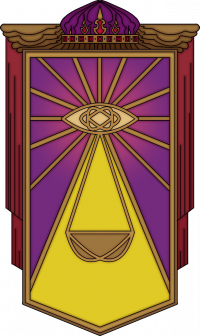 | |
| Religion | |
| Pronunciation | Yoon-yen-is-m |
| Origins | Emperor Theomar |
| Deities | |
| The Everwatcher and various other Gods and Goddesses | |
Origins
The origins of Unionism are well recorded as it is one of the youngest religions in the world. Unionism was originally founded as an Ailor-only religion by the prophet Emperor Theomar I Ivrae-Kade, of the Regalian Empire following its founding. The prophet spoke about a divine entity called the Everwatcher contacting him in a series of visions, before appearing to him in person, to speak to him about the fate of all living things under the stewardship of the Ailor Race. Emperor Theomar then wrote the holy chronicle called the Creed, which acts like holy scriptures, containing all the religious laws and concepts dear to Unionism. Following the prophet’s death, it was ordained that the Everwatcher would select Emperors of Regalia as its Vessel through which it would speak and guide destiny. Each successive Emperor has made small and large changes to Unionist doctrine by editing parts of the Creed, meaning this holy scripture ended up being a document that evolved as time passed. The Religion has gone through various phases referred to as "ascendancy", "revisionism", and "advancing". The first of which defined a period up to the Regalian Pessimism when all Races were welcome, but the faith was very strictly enforced. The Revisionist era ran concurrent with the pessimism up until the Ranger Crisis, when ultra nationalists attempted to revise the interpretation of Creed and civil governance to make Unionism more Ailor-ethnic-centric and push down on other religions even harder. The Advancing era starting roughly with the rule of Emperor Alexander I is hallmarked by a return to the racial inclusion of the Ascendancy era, while also loosening the repressive enforcement of the Revisionism era, creating even an interpretation of Unionism that was more palatable to non-believers to support. Unionism is fairly unique in comparison to other religions, in that it suffered several schisms, major events of theological conflict between its worshipers that resulted in the community splitting each time. As such, there are 3 distinct Unionist beliefs now: Dogmatic, Evintarian, and Guided. Each of these have their own structures, beliefs, and hierarchy, though all invariably worship the Everwatcher, and work towards a common goal, of Regalian hegemony and rule over all the world and its people and for the Emperor of Man to become the Emperor of All.
Schisms
Evintarian Schism
The Evintarian Schism occured directly after the death of the prophet Theomar, when the Concilly Council convened to discuss the matter of the succession. Several Concilly members had dabbled into Magic already, and more of them were of the opinion that Magic could be used to advance Humanity by using it. The hardliner Dogmatic Councillors however felt that Theomar’s preaching on the purity of the soul proved that Magic was a corruption that should be guarded against. The Schism occured when the hardliners broke off the Conclave and started hunting down Magic-users, turning the Empire distinctly anti-Occult. The Evintarian (named after their preacher Horopados Evinter), fled to Etosil and seceded from the Empire. They were later re-integrated into the Empire, but remain religiously separate. And have developed a more pro-Occult and evolution-oriented view of Unionism called Evintarian Unionism. There remains a lot of bad blood between the Evintarian and Dogmatic Unionists because of the religious violence between the two over the centuries.
Guided Schism
The Guided Schism has a somewhat more staggered appearance, in that it did not come about in just a single schism. However, Guided Unionism chiefly came through the unification of two notable splits from traditional doctrine, Dogartan Unionism and Vultragon Unionism. Dogartan Unionism was a very small schism of Anglian preachers who rejected the wealth of the Evintarian and Unionist Councils, espousing the virtues of asceticism and poverty. Vultragon Unionism on the other hand was triggered by commoner resentment against the aristocracy and the ruling classes abusing their power, embracing critical thinking as they questioned authority. In recent years, the Dogartan Celates developed new theological arguments heavily rejecting Ivrae-Sange legitimacy and establishing the Guided Divine Beings as their true version of Canon, claiming that the Ivrae dynasty was so incompetent that by their incompetence, they admitted to being usurpers of the true Vessels. This message was well-received by the Vultragons, leading to both communities to merge into the Guided Schism. Many other fringe groups were successfully absorbed by Guided Unionism during this time and afterward as well. Because of its inherently critical nature and belief that Alexander is not the correct Emperor, Guided Unionism is not well liked by the other religious schisms of Unionism.
Core Identity
Unionism is a Polytheistic religion with a single superior divine being, who is intangible and provides only spiritual guidance, while the Gods and Goddesses interact with the faithful and apply their divine will and power on the world. This intangible supreme being called the Everwatcher reincarnates in every Regalian Emperor (passing through females, but never permitting them to inherit) when they pass on to guide the mortals through the Emperor's words. Unionism has tenets, but as opposed to a clear set of vices and virtues, Unionism's Tenets are the Divine Lessons (which increase as new Gods are added over time). Unionism is unique when compared to other Religions as it did not start out with a Pantheon save for the Everwatcher, the supreme being, and Theomar the Prophet. It expands as time passes, as new Gods and Goddesses are discovered, or Gods from other conquered religions are added. This makes Unionism the only true Syncretic religion in the world, which generally promotes stability and cultural exchange in the Empire. Each God and Goddess represents a Divine Lesson, which is a guideline to live one's life by, but also a vice to avoid.
Beliefs
- Afterlife: Unionism has an Afterlife known as the Stairway of the Everwatcher, which is an endless staircase up to the (empty) throne of the Everwatcher which he will ascend to in Paradise. Unionist religion is unique in that it states that once the true virtuous and faithful Empire blessed by the Everwatcher commands all souls on the world (this is called the Great Way), that the Everwatcher will reward service by creating paradise, a world without disease, without suffering and without death. All those who were judged virtuous and entered the Stairway of the Everwatcher will come back to life, and join their descendants and loved ones in eternal bliss. Those that fail the judgement of virtue on the Stairway are instead reincarnated to have another chance at proving themselves for the Great Way.
- Canon Evil: Canon evil is somewhat dubious, and exists on multiple levels. The most obvious evil in Unionism is called the Sin of Creation. The Sin of Creation implies that all living beings were born with inherent flaws to overcome to prove their worthiness for the cause of the Great Way. As such, evil is done simply because people do not have self control or inhibitions. The next stage of evil are Spirits. Unionism acknowledges all entities coming from different dimensions save the (Alorian) afterlife as Spirits seeking to corrupt the minds and wills of the living. These beings infest or seduce the living into giving into their Sin of Creation. The third level of evil is somewhat more ambiguous, as it is other religions. While Unionism doesn’t strictly deny the existence or validity of other religions, it does claim that by worshiping anyone but the Everwatcher, that the living are led astray from creating Paradise, and that they live in sabotage of the Great Way’s conclusion. Essentially, other religions are seen as a distracting evil.
- Conversion: Unionism is a religion that has invariably been applied with the sword, or without word, and both interpretations are somewhat correct. Unionists believe that a person, even one who is not Unionist or pretends to be Unionist, can still work towards the Great Way if pointed in the right direction by the faithful. This is why the Confessions of Melennar are important, because this preacher created a common understanding that as a Regalian Unionist ruler, one’s non-Unionist subjects can still work towards the Empire’s cause, while not believing in the Everwatcher, and their soul can still ascend to the Unionist afterlife if their own religion or a-religiosity will not claim them. As such, conversion by the sword is also fully acceptable, because it forcibly induces someone into the Great Way, though it has become more controversial and less acceptable as of late.
Gods and Goddesses
Unionism is currently undergoing the Divine Merger, involving the Schisms coming back to the mother Unionist religious community. This process will be slow, so updated Gods will be added to this list as time passes, with the old forms still shown below.
=OLD LORE BELOW HERE===
|
|
|
|
|
|
|
|
|
|
|
|
|
|
|
|
|
|
|
|
Priestly Activities
Dogmatic Unionist priests are part of the so-called Dogmatic Religious Community. At the very top is the Concilly Council. Originally this organization had a leader called the Supreme Reverend, however the Supreme Reverend position was abolished when the last Supreme Reverend discovered insidious corruption within the religious community, tried to expose it, and was assassinated for it. To compensate, Conclave determined that the Dogmatic community should henceforth be ruled by a Council of elder Arch-Celates. Below the Concilly Council, are the Arch-Celates, which are equivalents to Dukes in the Regalian Empire. They wield considerable power and rule over vast areas of land, subdivided into Celeries. Below the Arch-Celate is the Celate, or just the average priest. Each Celate administrates a Celerie, which is usually a piece of land donated to the clergy where they maintain temples, shrines, and convents, while also producing crops and tending to cattle. Celates perform all religious tasks such as confession, preaching, hearing concerns, and simply taking care of Unionist needs like a social caretaker or mental health worker. Arch-Celates on the other hand are more administrative in that they take care of the treasury, any military attached to the religious orders, and communication between the Concilly Council and the vast wide-spread Unionist elements. Formally the Emperor is the leader of the Holy Seat, which is more of a group term for the Palace and the Concilly Council grouped together, but historically Emperors have interfered very little in the day to day running of the Celeries, and as such, this fact is usually ignored, the Emperor being considered a completely independent entity. This has also historically separated the Emperor from controversy among the Celates, and vice versa.
The Nuance of Godly Tribalism
For those who have lasted long enough to read to this point, it should have become obvious that not all Gods and Goddesses see eye to eye, and that some of them even directly contradict each other. While the Creed theoretically exists to apply the correct interpretation and lessons to be learned from the Gods and Goddesses, reality often finds for example Elen and Taal followers at odds, and Elia and Niall & Nolan followers at odds because of ideological differences. Unionism does not demand the universal worship of every God and Goddess, often the faithful only pick a few that really apply to them, after all, why would an Anglian peasant worship the God of King and Emperors if only in passing to praise his name for the Creed and Prophecy. No God or Goddess is also more or less correct than another, in the eyes of the Everwatcher, each God has some degree of validity, and some degree of error which is prone in the Sin of Creation, both in the fact that even Gods and Goddesses can sometimes act in error, but also in that mortals can apply the wrong interpretation of their lessons to reality around them. It is important never to call another Character a heretic for preferring one God or Goddess over the other and disregarding the preaching of one to uphold those of another.
Trivia
- Unionism used to be mandatory for nobility somewhere during the second century after Cataclysm, though this Holy Law was removed when the war against the Skagger Horde ceased, and the Empire benefited more from including non-Unionists into the peerage. An exception had always been made for the Altalar nobles of Solvaan origins in Solleria however, called the Confessions of Melennar.
- Sectarian violence largely came to an end at the turn into the fourth century as the last attacks on Vultragon Unionist by state forces ceased, and an uneasy truce was signed between the Schism religious communities. They still do not see eye-to-eye, and the different Schismatic groups still prod at each other, but instead of murdering each other over sectarian differences, they mostly fight with words nowadays, a legacy of the Kleine Rechnung, the document that called for the truce.
- Despite Elen's absorption into Unionism, the Breizh still maintained a high level of cultural autonomy, some even clinging to old beliefs. As such, even when Magic became illegal in the Empire, the Breizh Aelrrigan Order continued to find and train Mages safely in their sanctuaries while the rest of the Empire turned to brutal oppression (and the Magic part of Elen was suppressed from dogma). Elen's faithful among the Aelrrigan Order are commonly cited as the reason why Magic acceptance eventually returned, and Elen's magical nature in theological teachings was returned.
| ||||||||||
| Accreditation | |||||||
|---|---|---|---|---|---|---|---|
|
| ||||||
